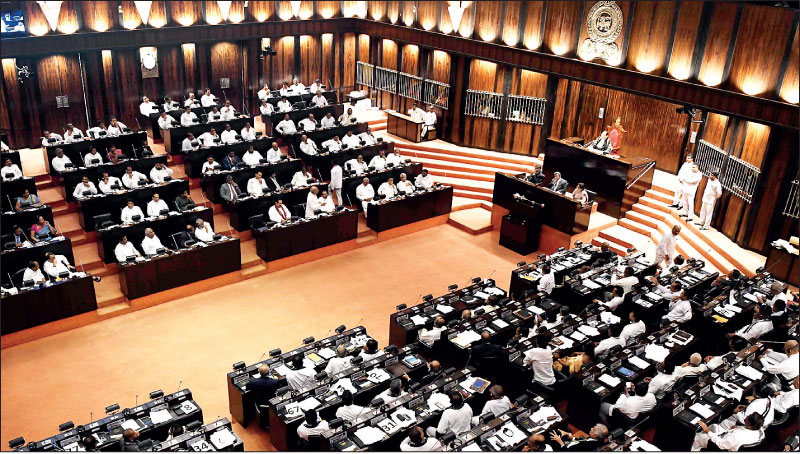Tuesday Feb 17, 2026
Tuesday Feb 17, 2026
Friday, 20 May 2022 00:30 - - {{hitsCtrl.values.hits}}

Many Parliamentarians with insomnia have perhaps read the Constitution only in order to fall asleep
 The appointment of a national list parliamentarian as the prime minister by the sole survivor of a defenestrated clan that claimed a license to kill fellow Sri Lankans brings into stark focus the issue of the legitimate use and the flagrant abuse of the national list arrangement in the constitution. A 21st Amendment must rectify the glaring defects in the present system.
The appointment of a national list parliamentarian as the prime minister by the sole survivor of a defenestrated clan that claimed a license to kill fellow Sri Lankans brings into stark focus the issue of the legitimate use and the flagrant abuse of the national list arrangement in the constitution. A 21st Amendment must rectify the glaring defects in the present system.
That a person rejected by the electorate in a pocket borough of his party could only enter parliament as a national list member and then be appointed as the prime minister is a perplexing development for most people. Indeed it is a vivid example of how violations of the Constitution have become commonplace and of the democracy deficit that was unquestionably accepted until now.
The national list system originated in the Soulbury Constitution which provided for nominated members to parliament. Section 11(2) of that constitution provided for the appointment of six persons by the Governor General “to represent any important interest in the Island which in his opinion is not represented or is inadequately represented.” That arrangement, the precursor to the national list system, was meant to provide representation to communities that lacked the numerical strength in their respective communities to be elected on their own steam and to enrich the quality of parliamentarians by allowing highly-qualified persons who shun the hustings.
This system was a creative way of making for an inclusive legislature. An Englishman, Singleton Salmon, whom Bandaranaike called a “single salmon” was a member of parliament under the Soulbury Constitution. So was E.F.N. Gratiaen before he was appointed to the Supreme Court. The politicians at that time, decent people guided by a sense of ethics, did not abuse this system and appointed their own relations or cronies as nominated members.
Unfortunately, at present, a chasm separates the objectives of the applicable constitutional provisions, Articles 99A and 100, and their implementation. If one should ever doubt the widespread complaint that degenerates occupy much of the political space, one should consider the case of the son of the Leader of the House, a grandson of a political giant, who was brought into parliament through the national list. The whole purpose of the national list, which is to facilitate the entry of eminent persons who are unwilling to enter the hustings but whose presence will enrich the quality of parliament or representatives of micro-minority communities, is cynically ignored.
Only in a parliament of losers will the National List be used to smuggle in children of sitting parliamentarians who then benefit from duty free car permits, salaries, and other undeserved perks. The mutual back scratching club prevents strong protests from the Opposition about how the public service remit is ignored when using the National List system. Its abuse is but one symbol of arrogance and privilege of these nationalistic posturers that have spawned widespread protests across the country.
The collaboration among members of the political class in deforming the Constitution is evidenced in the abuse of the Article 99A. The sovereignty of the People affirmed in Article 3 is, in the legislative sphere, delegated through Article 4(a) to the “elected representatives” of the People. Persons properly nominated under Article 99A are included in the term “elected representatives” perhaps because the electors indirectly approved of the list of possible nominees. A purposive reading of the provision should require the exclusion of persons rejected by the voters at the election.
In 2015, academics worked tirelessly to defeat the individual who had functioned as the Minister of Higher Education. However, the defeated candidate was brought into parliament through the national list. The picture of his smirking face after being rewarded with a portfolio was a contemptuous slap in the face of the sovereign people who had exercised their franchise to send him home. The entry into Parliament of the current prime minister who was also rejected, for him, in a very safe electorate is no less offensive to the voters that rejected him. The Supreme Court appears to be unwilling to interpret Article 99A to require exclusion of defeated candidates. A 21st Amendment must put the issue beyond doubt and explicitly state that defeated candidates may not enter Parliament through the National List.
The 21st Amendment must restrict inclusion in the National List to persons in the professions who have not engaged in politics and to members of micro-ethnic communities. No one who is not a member of the list should be allowed to enter Parliament and appointment shall be based on the order of priority that is identified in the list submitted by respective political parties.
When the previous president attempted a constitutional coup by dislodging the sitting prime minister, a full bench of the Supreme Court unanimously rejected the sacking by declaring the sacking unconstitutional. The Court displaced the usurper despite his goons in Parliament attacking the Speaker with chilli water and bibles. Likewise, a full bench of the Supreme Court must repudiate the recent constitutional coup by rejecting the appointment by the current President of a Prime Minister who, under the plain language of the Constitution, is not a member of parliament. Fidelity to the plain reading of the Constitution provides the basis of such a rejection.
Critics of the judiciary have rightly or wrongly accused the courts of pusillanimous interpretations of the Constitution when it allowed a convicted murderer to sit in Parliament pending his appeal. When there is a choice of affirming the sovereignty of the People by a strict scrutiny of actions that threaten that sovereignty or accommodating the interests of deplorables, the courts, these critics claim, tend to favour the latter by reducing the purchase of clear language in the Constitution. Reversing this trend is imperative. The starting point of any discussion of the controversial Prime Minister appointment must naturally start at the grundnorm of the Sri Lankan State which is Article 3.
The sovereign people delegate the exercise of legislative powers under Article 4(a) to elected representatives. Only elected representatives are empowered to make laws binding the sovereign people. Impostors are excluded. Article 62(1) emphasises this requirement of legitimacy when it requires that such persons in parliament be “elected in accordance with the provisions of the Constitution.” Thus, Article 62(1) requires the courts, the speaker, and the sovereign people to confront the simple question: “Was the Prime Minister elected in accordance with the provisions of the Constitution?” The Constitution clearly provides a negative answer.
In its pertinent part, Article 99A of the Constitution reads as follows:
“Where a recognised political party ** * is entitled to a seat under the apportionment referred to above, the Commissioner of Elections shall by a notice, require the secretary of such recognised political party * * * to nominate within one week of such notice, persons qualified to be elected as Members of Parliament * * * to fill such seats and shall declare elected as Members of Parliament, the persons so nominated.”
Even a first year law student would not be troubled if asked to interpret the sub-article. No Sri Lankan Erskine May need help her. She would state the obviously correct answer dictated by the plain meaning of the above language. Her answer would be that once the Commissioner of Elections sends the notice, the secretary of the political party in question has to, within one week, and only within one week, of the notice, nominate persons from the national list. Pressed to explain further, she would point to the use of the word “shall” (mandatory) as opposed to the word “may” (discretionary) with regard to the duties of the Commissioner spelt out in Article 99A.
The Commissioner has no power to declare elected anyone who was nominated after the one week window closed. But a believer in Humpty Dumpty jurisprudence would disagree with her reasoning. “When I use a word,” Humpty Dumpty stated, “it means just what I choose it to mean, – neither more nor less.” Only in the ill-fated Mr. Dumpty’s universe can the word “shall” mean “may”.
Accordingly, the student would correctly point out that at the end of the week after the receipt of the notice, the window for nomination closes and no valid nomination may be made thereafter. As everyone knows, the Prime Minister was nominated many months after the window closed. Because of the ghastly incompetence of the Speaker and his advisors, or perhaps because the Speaker was so directed by the President, the Prime Minister was seated in Parliament. His participation in parliamentary proceedings has been illegitimate. He is not a member of parliament. To remain in parliament, he would have to resign, change parties, and replace a National List member of another party who will doubtless be rewarded in ways familiar to the electorate.
To add insult to injury, Article 100 requires the Prime Minister to pay the princely sum of Rs. 500 for each day that he sat/sits or voted/votes in Parliament. This is a personal fine and he cannot seek reimbursement from his party. The Attorney-General is required to bring an action in the District Court of Colombo to recover, what Article 100 refers to as, a “liability due to the Republic”. As a qualified lawyer, the Prime Minister can be deemed to be someone who had reason to know that his participation in Parliament was illegitimate.
Whether the Attorney-General, not renowned as a doughty fighter for the independence of his office, will evade his constitutional duty to recover a “liability due to the Republic” or not is something that the Bar Association of Sri Lanka would have to monitor. However, a writ of mandamus could be brought to compel him to perform an explicit duty cast upon him by no less an instrument than the Constitution which lays down the only way on how the sovereign people may be made subject to laws.
If the Attorney-General does his duty, Humpty Dumpty would have a great fall and all the self-styled king’s horses and all the king’s men, whether or not armed with assault rifles, will not be able to put Humpty Dumpty back together again.
The legitimacy of any state appointment, especially an important appointment as the prime minister, cannot be legitimised by an impulsive tweet from the American ambassador. Legitimacy must rest on a more secure foundation, the Constitution of the Republic. The Constitution provides for the exclusive ways by which the Article 3 sovereignty of the people is to be exercised. Those ways cannot be bypassed. The Sri Lankan ambassador to America did not tweet support of the hordes of barbarians who invaded the Capitol on 6 January last year and tried to overthrow the American constitution. Likewise, the American ambassador, who obviously loves Sri Lanka and its people, would do well to tweet support for the rule of law and the upholding of the Sri Lankan Constitution.
It will be instructive to examine the reasons which the Supreme Court will provide if called upon to rule on the matter. Many parliamentarians with insomnia have perhaps read the Constitution only in order to fall asleep. The People and the courts should jerk them into the reality of who owns the country and remind them that this precious document is something more, much more, than a sleep aid.